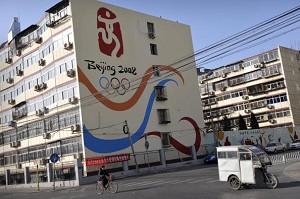It is less than 200 days before the opening of the Beijing Olympics in August and the air pollution in Beijing has increasingly been a grave concern. Despite the Chinese regime’s exhausting efforts and huge budget for improvement, the qualms regarding Beijing air quality have not been moved and thus caused an additional negative image.
Since Beijing was first announced as the site of the next Olympics, its air quality has been a topic of international concern. Because of China’s rapid economic growth in recent years, air pollution caused by largely unregulated industries has been an unwitting accomplice to global warming. Beijing is one of the most polluted cities in the world. Its potential threats to health have also given rise to international criticisms.
When China first applied to host the Olympics they had made a commitment to complete 20 improvements in the Beijing environment; six of them were related to air quality involving a US$12.2 trillion budget.
Additionally, the Beijing Olympic Committee and United Nations Environment Program (UNEP) signed an agreement, which includes the avoidance of air pollution, water and noise pollution, a friendly environment in communications and landscaping, actively publicizing and directing environmental consciousness, and an expectation of establishing a green environment model for the Olympic Games.
Presently, Beijing has 3.1 million automobiles. Their emission constitutes 40 to 50 percent of the air pollution in Beijing. For this, Beijing authorities have plans to reduce approximately 1.3 million cars on Beijing’s road during the Olympics.
Additionally, Beijing authorities have pushed many measures including, the closing of thousands of small coal mines and construction sites around the City, closing factories spewing polluted waste and encouraging the reporting on factories that produce polluted waste with cash awards and more.
Although Beijing has made an effort, rapid economic development and the increase of over a thousand cars a day have affected made limited results, and the Olympics construction projects to the tune of US$40 billion has also worsened the air quality.
The predetermined number of “blue sky” days in Beijing for 2007 was not realized until December 31. The assistant head of Beijing Environmental Protection Bureau, Du Shaozhong said that, reaching the “blue sky” goal would be extremely difficult.
As the Beijing Olympics approach, improving the polluted air in Beijing must be inevitable. Major Guo Jinlong of Beijing admitted recently that, reducing emissions and pollution is the first priority for this year, but the difficulty is almost insurmountable.
The international community is concerned that Beijing’s efforts have been ineffective. The UNEP’s report indicated that, Beijing’s air pollution far exceeds the bottom line of safety set by the World Health Organization (WHO). The prediction is that the pollution in Beijing is well beyond making a notable improvement before the Olympics.
International Olympic Commission (IOC) chairman Jacques Rogge said that if the pollution problem was too severe, they might delay endurance sports events such as marathons. In addition, some countries have decided to push back athletes’ arrivals of Beijing to avoid possible harm caused by the harsh environment.
It is six months before the Beijing Olympics, and although the Chinese regime has greatly publicized its grand efforts, the air quality still makes many countries’ athletes shrink back at the mere sight.
But China’s already has a set order of priorities, the economy, resolving various social conflicts, and maintaining social stability. It is indeed as some Beijing specialists have said, that under these considerations, although the authorities are also making efforts in environmental protection, it definitely is secondary, and will not be done properly .

